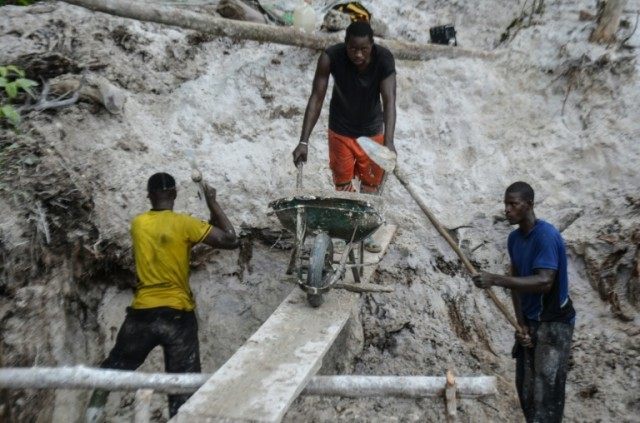Mayibouth (Gabon) (AFP) – In the remote wilderness of the Belinga mountains in northeast Gabon, men with shovels in hand dig from morning to night, filling wheelbarrows with soil laced with what they are looking for: gold.
The clearing in the equatorial forest is covered with dozens of holes, some four metres (13 feet) deep.
“We arrive around seven in the morning, and finish at 6:00 pm… the production isn’t that good,” says Aboubakar Coulibably, a Malian with muscular arms who moves around 200 wheelbarrows full of the gold-bearing soil per day.
On good days, his team finds around nine or 10 grammes of gold.
The production may be small but now Gabon’s government requires that these men panning for gold must sell what they find to the west African state — a situation the artisanal gold miners don’t like especially in the face of growing competition from Chinese mining companies.
William M’bouma employs five or six workers for around 10,000 CFA francs (15 euros) per day.
“We don’t have a choice, it’s hard but we make do,” says the 31-year-old Gabonese, who came back to his native village after taking his chances — in vain — in the capital Libreville.
In the city like in the countryside, “there are no companies which can train or hire young people. If you don’t want to stay with nothing to do, you have to find things to do like gold panning,” he says, as youth unemployment stands at more than 30 percent,
But in 2014 the government decided to address the “anarchy” of the situation of the artisanal gold diggers and launched a system for buying and collecting their small-size production.
The stated objective was to have “better visibility and control of the activity,” explains Wesbert Moussounda, director of the Gabonese branch for gold collection, a subsidiary of the Societe Equatoriale des Mines (SEM) charged with developing Gabon’s mineral resources.
Last year, the CGCO collected 55 kilogrammes (121 pounds) of gold, a modest amount considering that around 10,000 people work in gold panning nationwide, according to the World Wide Fund for Nature (WWF) in Gabon.
The state’s management of this gold production “will improve living conditions for our people” with the development of “small mines better organised and semi-automated,” says Moussounda.
– ‘Question of survival’ –
But the gold panners faced with the government’s demand for their production say they are the losers in this deal.
“Before we got around 20,000 CFA francs per gramme but now since they (the government officials) came, it’s fallen to 17,000,” says Simon Pierre Matamaya, chief of the camp 6 village.
He says officials blame the price on market conditions, “but we don’t know”. An ounce of gold on the commodities market currently sells for around $1,200 per ounce.
“This isn’t a business, it’s a question of survival,” Matamaya adds, pointing to the makeshift shelters in the camp, with no water, no electricity, and families sleeping on the ground.
Gold mining began in Gabon in the 1940s during the French colonial era and gold panning today takes place at the old sites.
But a few months ago, excavators cleared out a new large section of the forest. The Gabon mining firm SEM, which hopes to discover new reserves of gold, has signed a partnership with the Chinese company Myanning to explore the area.
Gabon is home to a wealth of mineral riches including manganese, iron, uranium and diamonds that have yet to be exploited and are attracting more and more Chinese companies, already involved in oil, wood and public works.
The Belinga mountains also hold one of the biggest iron ore deposits in the world, estimated at more than a billion tonnes. That mining project has been given to another Chinese group — the China Machinery Engineering Corporation, although there’s been no activity since 2008.
In the mining districts Myanning is supposed to hire local gold panners, but at camp 6 they are sceptical.
“Since they (Chinese) are here… we don’t know much about what they are doing,” said one gold panner. “Who can assure us that they are not going to just take their gold and leave?”

COMMENTS
Please let us know if you're having issues with commenting.